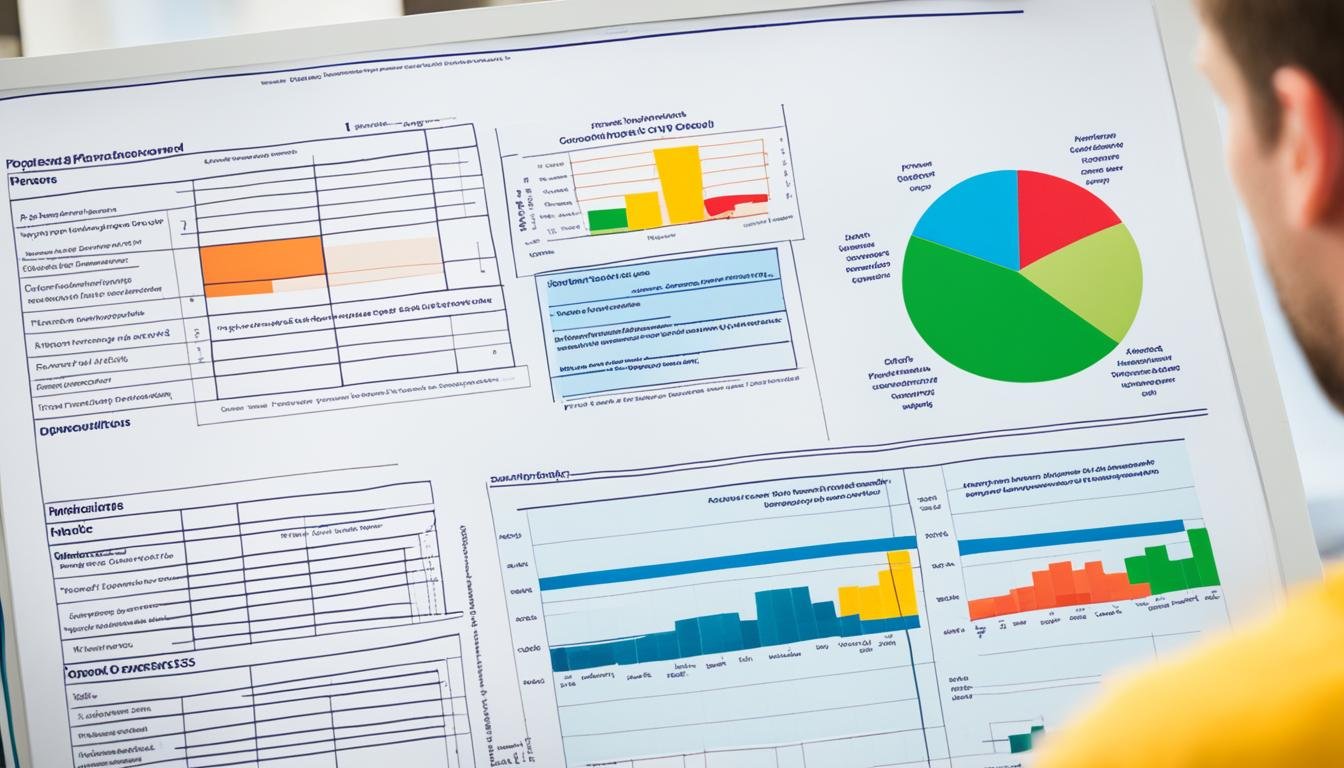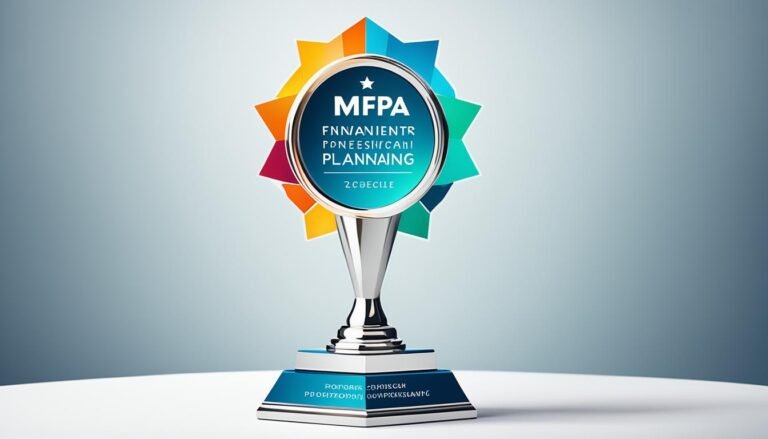Review of Master of Science in Finance and Accounting (MSFA) Programs
Did you know that the need for online education, including MSFA programs, has grown a lot? The COVID-19 pandemic made many switch to online learning. This has shown the value of online education, especially for those in finance and accounting looking to grow their career.
It’s crucial to explore your options when looking into MSFA programs. Be sure to check program rankings, the curriculum, how to get in, and the costs. We aim to give you a detailed look at the best MSFA programs. This includes what they offer, how they fit your goals, and their career benefits.
Key Takeaways:
- There is a growing demand for flexible online MSFA programs.
- Reviewing and comparing MSFA programs is essential to make an informed decision.
- Program rankings, curriculum alignment, admissions criteria, and cost analysis are key factors to consider.
- MSFA programs offer a comprehensive and flexible pathway to professional growth in the finance and accounting industry.
What is CFFP’s Masters in Financial Analysis (MSFA) about?
The MSFA at CFFP is a top-notch online program. It’s designed for students who want to have an edge in financial analysis. They learn about different financial topics, like how to look at an economy or a company’s financial health.
This program gets you ready for the world of finance. It pushes you to think critically and solve problems. These skills are vital in the fast-paced finance world.
By following the CFA Program, CFFP’s MSFA makes sure its students are getting the best knowledge out there. It’s all about meeting high industry standards. This adds a lot of weight to the degree.
Teachers here are not just anyone. They’ve been out there, working in finance. Students also learn a lot from each other since everyone comes from different places. This mix makes learning here really dynamic.
One of the best things is you can choose your own study times. So, it fits perfectly with your job or other stuff you’ve got going on. The online platform is made to keep you interested and connected.
“CFFP’s MSFA program provides a comprehensive curriculum that equips students with the necessary financial analysis skills and knowledge to succeed in the competitive finance industry.”
After finishing the MSFA at CFFP, you’re set for some exciting jobs. Whether it’s in banking, managing assets, consulting, or finance for companies, you’re good to go. The focus is on what you really need to know to face finance head-on.
Who is MSFA suited for?
The MSFA program is perfect for those with a Bachelor’s degree who want to be financial analysts. It’s also great for finance people already working but seeking a grad degree.
“The MSFA program offers a practical pathway to careers in financial analysis, investment banking, portfolio management, risk management, and securities research.”
If you’re fresh out of college or already working, the program will help you. You’ll learn advanced financial analysis, quantitative methods, and more. This will build the base you need to be a successful financial analyst.
The program also teaches you about financial statement analysis, managing portfolios, and how to handle risks. These skills are key for making good financial choices and helping companies with your insights.
After you finish, many doors will open in fields like investment banking and consulting. Your MSFA degree will lead to exciting job offers in finance.
Key benefits of the MSFA program:
- Enhanced career prospects in finance, particularly as a financial analyst
- Opportunity to earn a graduate degree while continuing to work
- Development of advanced financial analysis skills and techniques
- Expanded knowledge in areas such as investment management and risk assessment
- Credibility and recognition in the finance industry
The MSFA program caters to those who dream of a financial analyst career. It’s for fresh grads or professionals aiming to boost their skills. This graduate course gives you what you need to thrive in finance.
Next, let’s look at how the MSFA program assesses student work and evaluates courses.
MSFA exam format: Exams? We don’t need no stinkin’ exams…
The MSFA program uses a special way to check students, leaning away from just exams. Students show what they know in different types of assignments. This lets teachers see how good they are at financial analysis.
Here’s how students get checked:
- Scheduled Reading Assignments: A list of readings is given to students. This helps them get better at finance.
- Group Discussions: Talking with others is big. It helps students share ideas and learn more.
- Case Studies: They look at real-world problems. This makes them use what they learned in a practical way.
- Exams: While not the main way, there are still exams. They make sure students understand the lessons.
To get the MSFA degree, passing all 10 courses is a must with at least a C. Also, keeping a 3.0 GPA is important throughout the program.
This way of checking students in the MSFA program is very detailed. It lets students prove they are good at financial analysis through different tasks, talks, and tests.
“Evaluation beyond traditional exams enables a more nuanced and comprehensive understanding of students’ financial analysis skills.” – MSFA Program Graduate
MS Financial Analysis topic areas and credits
The MSFA program covers many topics in financial analysis. It has 10 courses, each offering 3 credits. This adds up to 30 credits in total.
Here’s a look at what the program offers:
- Financial Statement Analysis
- Advanced Financial Statement Analysis
- Economics for Financial Analysis
- The Financial System, Markets, and Instruments
- Quantitative Methods
- Security Analysis and Valuation
- Corporate Finance
- Derivatives and Alternative Investments
- Portfolio Management
- Financial Analysis Capstone
The program aims to give a deep understanding of financial analysis. Students will learn to analyze financial statements, look at economy factors, check out investment chances, manage funds, and make smart financial choices.
| Course | Credits |
|---|---|
| Financial Statement Analysis | 3 |
| Advanced Financial Statement Analysis | 3 |
| Economics for Financial Analysis | 3 |
| The Financial System, Markets, and Instruments | 3 |
| Quantitative Methods | 3 |
| Security Analysis and Valuation | 3 |
| Corporate Finance | 3 |
| Derivatives and Alternative Investments | 3 |
| Portfolio Management | 3 |
| Financial Analysis Capstone | 3 |
The curriculum is made to build a strong base in financial analysis. It combines theory and practice. This prepares graduates for success in finance jobs. They will have the skills to analyze financial statements, choose smart investments, manage risks, and handle funds well.
MSFA fees: adding up the full bill
The price of studying a Master of Science in Finance and Accounting program changes by school. It’s critical for students to mind several key points when weighing the full cost of these programs.
Tuition fees
Tuition fees make up a major part of the cost. They pay for teaching, online materials, and help services. Schools have different tuition costs, so future students should compare schools to find the best value.
Textbooks and learning materials
On top of tuition, students need to think about the price of textbooks and study materials. Required materials often include books, online resources, and specific software. Students should add these costs to their budget.
Additional expenses
There are other costs students might face. This includes tech fees, library fees, and exam fees. It’s smart to check for any extra costs upfront.
Comparing different programs’ expenses is wise. This way, students can pick a good quality program that fits their budget.
By carefully weighing costs against program benefits, students can choose an MSFA program that meets their financial needs and ambitions.
Exam schedule & key deadlines
The MS in Finance and Accounting (MSFA) program lets students finish in under 2 years part-time. This works well for those with jobs and busy lives.
The MSFA program checks students’ progress with various tasks, not just exams. This includes things like projects and tests. It’s all about what students have learned.
To finish the MSFA program, being organized is key. Meeting deadlines for tasks and lessons is important for staying on track.
Planning your study time and sticking to your plan helps a lot. This way, you can steadily work towards getting your MSFA degree.
Key Dates:
- Course Registration Deadline: [Insert Date]
- Course Start Date: [Insert Date]
- Assignment Submission Deadlines: Vary by Course and Module
- End of Semester/Module: [Insert Date]
| Important Dates | Description |
|---|---|
| Course Registration Deadline | The deadline for enrolling in courses for the upcoming term or semester. |
| Course Start Date | The official start date of the course, when students gain access to course materials and begin their studies. |
| Assignment Submission Deadlines | Specific deadlines for submitting assignments, which may differ for each course and module. |
| End of Semester/Module | The official end date of the semester or module, marking the completion of coursework and the transition to the next phase of study. |
Make sure to keep an eye on the timeline and deadlines the program sets. This helps you stay focused and finish the program strong.
What are the entry requirements for MSFA?
The requirements for the Master of Science in Finance and Accounting (MSFA) program differ by school. However, most schools look at certain general criteria for applicants.
Bachelor’s Degree
To apply, you usually need at least a Bachelor’s degree. It should be from an accredited school, and ideally in fields like finance or business.
Professional Designations or Graduate Degrees
Some institutions also value professional certifications or higher degrees. These show your deep knowledge and serious interest in finance and accounting.
English Language Proficiency
Since the MSFA is often in English, you might have to prove your English skills. Tests like the TOEFL or IELTS do this. They make sure you understand complicated finance topics well.
It’s key to check what each school needs for their MSFA program. Requirements can differ, like needing work experience or recommendations.
After meeting all requirements, you’re ready to apply. This is the first step in getting your Master of Science in Finance and Accounting.
Benefits of MSFA: what’s in it for you
The MSFA program gives students valuable finance and accounting skills. It helps unlock career advantages and growth. By joining, students can gain skills in financial analysis that are important for many jobs.
Comprehensive Financial Analysis Skills
The program teaches students a lot about financial analysis. They learn about financial statements, how to analyze economies, and much more. This knowledge is key for jobs like financial analysts and portfolio managers.
Alignment with the CFA Program
There’s a big plus for students in the MSFA program. It aligns with the CFA Program. This means students are well-prepared for the tough CFA exams. It shows that MSFA grads are serious about their finance careers.
Flexible Online Format
The program also fits well for working professionals. It’s online, so students can study when it’s best for them. This flexibility helps students balance work, life, and education without problems.
Networking Opportunities
MSFA students get great chances to network. They meet students, teachers, and pros in finance. This can lead to internships and better job opportunities. Building a strong network helps students grow in their careers.
Career Advantages of MSFA Program
| Career Advantages | Description |
|---|---|
| Specialized Financial Analysis Skills | Learn skills that employers really value in finance roles. |
| Competitive Edge | The MSFA’s CFA alignment sets graduates apart, showing they value excellence. |
| Career Advancement Opportunities | An MSFA degree opens doors to better finance jobs. |
| Professional Network | Meet people who can help you grow your finance career. |
| Flexibility for Working Professionals | Work and study thanks to the program’s online nature. |
Choosing the MSFA program comes with several valuable perks. It gives you essential finance skills, connects you to the CFA world, and lets you study in a way that suits your life. Plus, it’s great for building your career through networking.
CFA vs MS in Financial Analysis: An In-Depth Comparison
The CFA (Chartered Financial Analyst) and an MS (Master of Science) in Financial Analysis are two different paths. They are good for those looking to work in financial analysis and investment management.
The CFA Program gives you specialized knowledge and skills in investment analysis and management. It’s known worldwide and shows you’re an expert in financial analysis, portfolio management, and ethics. Getting the CFA charter shows you’re serious about a career in investment analysis.
Meanwhile, an MS in Financial Analysis gives you a wider view of financial analysis and more. This degree helps students understand financial concepts deeply. It covers areas like financial statement analysis, corporate finance, and investment strategies. Graduates are ready for roles like financial analysts and portfolio managers.
Deciding between the CFA designation or an MS in Financial Analysis depends on what you want for your career. The CFA Program is great if you want to specialize in investment analysis. It focuses on the technical skills you need in the financial world.
If you want a broad financial education, then an MS in Financial Analysis might be for you. It covers many topics, giving you a solid foundation. You’ll learn about financial analysis, accounting, economics, and more.
Comparing the CFA Program and an MS in Financial Analysis
Let’s compare the CFA Program and an MS in Financial Analysis:
- Focus: The CFA Program is focused on investment analysis and portfolio management. An MS in Financial Analysis lists a wider array of financial topics.
- Credential: Earning the CFA designation shows expertise in investments and ethics. An MS in Financial Analysis is a master’s degree in finance.
- Career Opportunities: The CFA Program leads to jobs in investment analysis, portfolio management, and research. An MS in Financial Analysis opens doors to various roles in finance.
- Duration and Rigor: The CFA Program lasts around four years, with three exams. An MS is a master’s degree that takes one to two years.
- Curriculum: The CFA Program focuses on investment analysis and ethical practices. An MS in Financial Analysis covers financial analysis, valuation, and economics.
- Cost: Pursuing the CFA Program includes exam fees and study costs. The cost for an MS varies by school and includes tuition and other fees.
The decision to go for the CFA Program or an MS in Financial Analysis depends on what career path you want. The CFA is good for those who want to focus on analysis. The MS offers a broader view of finance and related areas. It all comes down to your goals and interests.
CFA vs MSFA Comparison
| Factor | CFA Program | MS in Financial Analysis |
|---|---|---|
| Focus | Investment analysis and portfolio management | Financial analysis and related topics |
| Credential | CFA charter | Master’s degree |
| Career Opportunities | Investment analysis, portfolio management, research | Financial analysis, risk management, corporate finance |
| Duration | Around 4 years (3 levels of exams) | 1-2 years |
| Curriculum | Investment analysis, ethics, portfolio management | Financial statement analysis, valuation, economics, quantitative methods |
| Cost | Exam registration fees, study materials, preparation courses | Tuition fees, additional expenses |
Masters in Financial Analysis FAQ
Got questions about Master of Science in Financial Analysis (MSFA) programs? Look no further! We’ve gathered some commonly asked questions and answers to help you out.
Admission Requirements:
1. What are the admission requirements for MSFA programs?
Admission standards vary but mostly need a Bachelor’s from an accredited school. Some might need professional certifications or other degrees too. You’ll likely need to show you’re comfortable with English.
Curriculum:
2. What topics are covered in MSFA programs?
MSFA programs go deep into things like financial statements, corporate finance, and portfolio management. You also learn about securities analysis and valuation, alternative investments, and more. The exact topics can change based on the program.
Career Opportunities:
3. What career opportunities are available to MSFA graduates?
Graduates can find work as financial analysts, portfolio managers, and more. With the strong skills from their MSFA, many exciting and well-paying job opportunities await.
Program Duration:
4. How long does it take to complete an MSFA program?
It usually takes 1-2 years for a full-time student to finish. There are also part-time choices for those working. This allows professionals to get their degree while keeping their jobs.
Cost and Financial Aid:
5. How much does an MSFA program cost?
The cost varies by school and where it is. Remember to consider tuition, books, and other costs. Looking into different programs and what financial aid they offer is smart.
Flexibility:
6. Can I pursue an MSFA program while working?
Yes. Many programs have flexible schedules and online classes. This allows working professionals to enhance their skills without quitting their jobs.
Accreditation:
7. Are MSFA programs internationally recognized and accredited?
Yes, respected MSFA programs are accepted globally and often have accreditation. It’s crucial to pick a program from a well-known school. This ensures your degree is valued in the finance world.
Having learned about MSFA FAQs, you’re now ready to decide if this path is right for you. If you need more help, don’t hesitate to contact admission offices for more details.
Conclusion
The Master of Science in Finance and Accounting (MSFA) program gives a detailed education in financial analysis. It equips students with skills to do well in finance roles. This program works for those who need to keep working while studying.
It’s linked with the CFA Program, which helps students prepare for the CFA charter. The MSFA helps in careers like being a financial analyst or manager, or a risk manager. You learn to make smart money decisions and understand financial facts better.
The MSFA program boosts your job possibilities in the finance world. It helps start or improve your career, offering a strong study program and links to the CFA world. Whether you’re new to finance or aiming for a higher finance job, this program lays a strong base for success.








